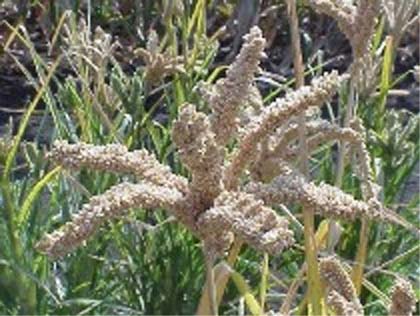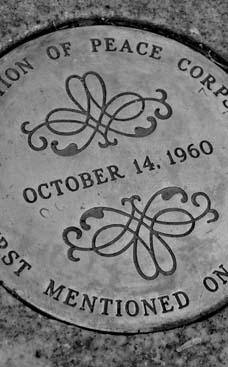
It has the third highest iron content of any grain, after amaranth and quinoa. Some varieties, such as those in Uganda and southern Sudan, have high levels of methionine, an amino acid lacking in the diets of hundreds of millions of poor people who depend on starchy foods, such as cassava. The cereal grain is generally ground into flour for making flatbreads. It's made into a porridge called tuo zaafi in the north of Africa, and into a flatbread called taguella in the Sahara.
Dominican Republic RPCV Danielle Nierenberg writes: Finger millet is high in starch and is considered "superior" to wheat in that its proteins are more easily digested
Finger Millet: A Once and Future Staple
Posted by Danielle Nierenberg on @ 8:19 am
Caption: The African native variety, finger millet, likely originated from the highlands of Ethiopia and Uganda and is one of the most nutritious all of the world's major cereal crops.(Photo credit: Global Facilitation Unit for Underutilized Species)
Though rarely consumed in the West, millet is a staple grain for much of the world's population, particularly in South Asia and East Africa, and has been cultivated for thousands of years. The African native variety, finger millet, likely originated from the highlands of Ethiopia and Uganda and is one of the most nutritious all of the world's major cereal crops. It can be used to make porridge, bread, malt, animal feed, popped millet (like popcorn), Ethiopian liquor called arake, and even beer.
The African native variety, finger millet, likely originated from the highlands of Ethiopia and Uganda and is one of the most nutritious all of the world's major cereal crops.(Photo credit: Global Facilitation Unit for Underutilized Species)
Finger millet is high in starch and is considered "superior" to wheat in that its proteins are more easily digested. It has the third highest iron content of any grain, after amaranth and quinoa. Some varieties, such as those in Uganda and southern Sudan, have high levels of methionine, an amino acid lacking in the diets of hundreds of millions of poor people who depend on starchy foods, such as cassava. The cereal grain is generally ground into flour for making flatbreads. It's made into a porridge called tuo zaafi in the north of Africa, and into a flatbread called taguella in the Sahara.
Finger millet can be an ideal crop in dry areas because it can lie dormant for weeks. Once the rains do come, the grain springs to life and can be ready to harvest in just forty-five days. The grain is resistant to rot and insects and keeps well in storage, making it an important staple when no other food is available. If kept dry, it can store for as long as five years.
Finger millet has an annual production of 4.5 million tons of grain, and Africa produces around 2 million tons. Though it was a predominant crop in Africa until recent decades, the crop's production has declined significantly. Despite its importance as a food crop, many policy makers in countries that grow finger millet generally regard it as a poor person's crop, and the scientific community has largely ignored it. Many farmers are giving up growing the labor intensive finger millet in favor of maize, sorghum, and cassava.
There's been somewhat of a finger millet resurgence, however. In Kenya, the grain currently sells at more than twice the price of sorghum and maize. In Uganda, half of all cereal cropland is producing finger millet. It is an important food in Uganda, and finger millet bread is served during harvest celebrations to impress visitors and neighbors. Ugandans also commonly serve finger millet porridge with sugar or banana juice.
The crop appears to be as beneficial in Asia as it is in Africa. In fact, India has increased yields by 50 percent in the last fifty years, and in Nepal finger millet acreage is expanding at the rate of 8 percent per year. This nutritious grain could also be beneficial for use in weaning foods and other cereal products in parts of the world where it is not currently being cultivated, such as South and Central America.
One hurdle in finger millet production is that it is a labor intensive crop. In Africa, the crop is most often harvested by hand and individual heads are cut off with a knife. The small size of the seeds makes it difficult to handle, and it takes a lot of skill and effort to make it into flour, especially by hand. Weeding is also problematic because the dominant weed in African finger millet fields is a relative of the crop and hard to discern from finger millet itself.
Danielle Nierenberg, an expert on livestock and sustainability, currently serves as Project Director of State of World 2011 for the Worldwatch Institute (www.NourishingthePlanet.org), a Washington, DC-based environmental think tank. Her knowledge of factory farming and its global spread and sustainable agriculture has been cited widely in The New York Times Magazine, the International Herald Tribune, The Washington Post, and other publications. Danielle worked for two years as a Peace Corps volunteer in the Dominican Republic and volunteers at farmers markets, the Earth Sangha (an urban reforestation organization), and Citizen Effect (an NGO focused on sustainable development projects all over the world). She has spent the last year traveling to more than 25 countries across sub-Saharan Africa looking at environmentally sustainable ways of alleviating hunger and poverty. She holds an M.S. in Agriculture, Food, and Environment from Tufts University and a B.A. in Environmental Policy from Monmouth College. Websites: www.worldwatch.org www.nourishingtheplanet.org Twitter: @worldwatchag













